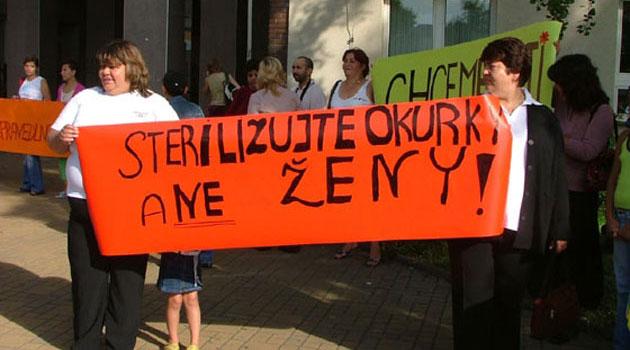Czech Helsinki Committee, Human Rights Minister draft law to compensate forced sterilization victims

The Czech Helsinki Committee and Czech Human Rights Minister Jiří Dienstbier (Czech Social Democratic Party – ČSSD) are preparing a draft law on compensating people who have been forcibly sterilized. The victims would reportedly receive anywhere between CZK 100 000 and CZK 150 000 (EUR 3 600 and EUR 5 400).
Czech daily Lidové noviny (LN) reports that as many as 1 000 people might apply for compensation. "The aim is to compensate the victims for this significant state interference with their physical integrity, which was undertaken without their freely given consent," the daily quotes Jarmila Balážová, spokesperson for Dienstbier’s office, as saying.
Balážová said the law is being shaped in collaboration with other ministries. According to LN, the norm would cover all victims of involuntary sterilization starting from the time of the previous regime, particularly between 1972 and 1991, when a decree was in effect making it possible to pay people CZK 10 000 for "ending their fertility".
"In 1990 I was 21 years old and I was expecting my second child. I went to the hospital because I was bleeding. They left me there for a day, then I was sent to the operating theater. It was supposed to be a Caesarean section," LN quotes Elena Gorolová as saying.
"However, there were complications. The doctors came and had me sign several papers that were supposedly my consent with that form of delivery," Gorolová says.
LN reports that, just like thousands of other victims, Gorolová did not suspect she was also signing her own forced sterilization sentence. It is very certain that a law to compensate forcibly sterilized people will be adopted, as it is supported by both the governing coalition and opposition MPs.
"It’s rather a shame we haven’t yet adopted a law to compensate the victims," LN quotes Markéta Adamová (TOP 09), the head of the lower house’s Subcommittee on Human Rights, as saying. The proposed amount of between CZK 100 000 and CZK 150 000 (EUR 3 600 and EUR 5 400) is rather low compared to other countries that have already compensated victims of involuntary sterilization.
"In Sweden, where during the postwar years as many as 63 000 victims were forcibly deprived of their fertility, those people became entitled at the end of the 1990s to the equivalent of CZK 435 000 [EUR 16 000]. From next year the compensation of such victims will also begin in the US state of North Carolina. Each of the approximately 7 600 people harmed there will be able to claim the equivalent of up to one million Czech crowns [EUR 36 000]. After North Carolina, other parts of the USA should follow. Roughly 65 000 people from another 32 states fell victim to medical sterilization interventions there," the paper reports.
Representatives of various Czech NGOs have been discussing the illegal sterilizations for many years. Last year the League of Human Rights reported that the practice did not solely concern Romani women in the Czech Republic, but also a large number of persons living with disabilities who were in institutional care.
The forced sterilizations took place both before and after November 1989. In 2004 the European Roma Rights Centre (ERRC) came forward with its suspicions that women, primarily Romani women, were still being forcibly sterilized in the Czech Republic.
Dozens of women then applied to the ombud for assistance while several others also turned to the courts. The Czech Government Committee against Torture proposed in 2006 that compensation be paid to the victims.
The Czech Government Human Rights Council received its first motion on the issue in 2007. Two years later, the cabinet apologized for the illegal sterilizations, but the UN Committee on the Elimination of Discrimination against Women (CEDAW) and Committee on the Elimination of Racial Discrimination (CERD) both say a mere apology is not enough.